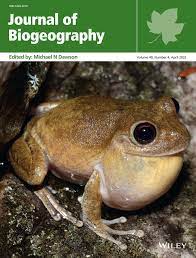Two-thirds of the associate editors of the Journal of Biogeography, a Wiley title, have resigned in a dispute with the publisher, and more resignations are likely, according to those involved.
Most of the resignations, reported first by Times Higher Education, were effective immediately, but a portion of the associate editors set August 28 as their effective date in hopes Wiley may negotiate with them about their concerns.
Most of the associate editors stopped processing new manuscripts at the end of June, as we reported last month, due to the dispute.
In interviews with Retraction Watch, two associate editors who had put in their resignations described concerns with the journal’s high article processing charges (APCs) fueling Wiley’s profitability, as well as the “breakdown in negotiations” between the publisher and the journal’s lead editorial team.
As we reported last week, Wiley moved to terminate Mike Dawson, the chief editor of the journal, as of August 27, after he had tendered his resignation in early May with the contractually-required six months notice. Dawson expressed disappointment that the publisher had “not made any efforts to address any of the issues” the editorial team raised.
“We’ve taken these decisions because we believe the decisions lead to the greatest success and longevity of the journal,” Dawson said. “It’s disappointing Wiley is not engaged. They would benefit in the long run. It’s that simple.”
The mass resignations at the Journal of Biogeography are the latest in a string of such actions by editors dissatisfied with the actions of publishers. Last week, many moderators of ProMED-mail, an infectious disease bulletin that reported the first cases of COVID-19, announced they were suspending work for the service after the host society said it would start charging subscription fees.
The Journal of Biogeography is not fully open access, but charges APCs of $4,800 for authors who wish to make their articles freely available.
Such fees are “excessive,” and “not affordable,” said Krystal Tolley, one of the associate editors who put in her resignation for the end of the month. Tolley is based in South Africa, and said she and other researchers in the Global South “just don’t have those kinds of funds.”
Wiley and other major publishers often waive fees for authors in low-income countries, and “transformative agreements” in which funding agencies or universities pay publication fees rather than authors.
But neither option is satisfactory, Tolley said. Few articles receive waivers, and as for transformative agreements, “I find it lip service. It’s not them who’s taking the hit, it’s still somebody who’s paying them.”
The publishing model of charging high fees for open access publication, Tolley and other associate editors wrote in an editorial about their work stoppage:
severely hampers the research visibility of early career researchers and those in countries with low-to-middle economies who cannot afford [open access] fees and therefore publish in less visible outlets. At the same time, this system promotes the visibility of those researchers with ample funds and allows unfair free access to their content. [Open access] combined with high APCs creates a pay-to-play system where those that have funds have research that is likely to be more visible and more cited.
Besides the journal’s high APC, the editors have also objected to what they understand as the publisher’s intention to make the journal entirely open access, increase its volume, and automatically refer rejected manuscripts to other Wiley journals.
The editors began trying to engage Wiley in discussion about their concerns near the beginning of this year, but the journal’s managers “essentially refused” to talk, Dawson said. After four months of frustration, he put in his resignation on May 6.
“It was clear that I could not achieve anything as chief editor when Wiley would not talk at all,” he said. He and the associate editors discussed what to do next, and settled on the work stoppage to try and pressure Wiley to the negotiation table. “Where we are now is the result of them not engaging seriously.”
Dawson said he suspected an email he sent informing authors who had submitted to the journal during the work stoppage that processing their manuscripts could be delayed sparked Wiley’s decision to fire him. He said Wiley initially attempted to fire him by email, effective immediately. He pointed out that termination without notice was in breach of his contract, and later that day received a letter giving him 30 days notice.
A Wiley spokesperson confirmed the dates of his resignation and termination but would not otherwise comment on the staffing changes.
A Wiley spokesperson previously told us that the journal was no longer part of the referral program for rejected manuscripts, and “there are no plans to flip the Journal of Biogeography to open access but that we continually evaluate our journals to ensure they stay aligned with subject areas and funding trends.”
Neither of those statements are concessions, Dawson said. He and the editors of the publisher’s other biogeography journals were only referring a small number of rejected manuscripts to each other, so they had essentially implemented the policy themselves.
Wiley “may not have an explicit plan” to make the journal open access, Dawson said, but at the beginning of the year the publisher was “absolutely clear” that they intended “to flip the journal to open access on a time horizon of two to four years.”
Regarding the resignations, a Wiley spokesperson told us:
Our highest priority is to continue delivering impactful research that serves the academic community and society at large. Wiley regularly meets with editors on issues that impact research publishing. To that end, we have extended several invitations to meet with the editors from the Journal of Biogeography to discuss their concerns and further support their important work. We appreciate the feedback shared by members of the academic publishing community and welcome further discussion to strengthen our journals and the people they serve.
Dawson noted that some of the 12 points the editors had raised for discussion were more difficult to resolve than others, and said the editors would take action on the easier things, such as setting up an advisory board consisting of the chief editors of the publisher’s biogeography journals, as a sign of good faith. Then discussion of the difficult issues, such as what constitutes a fair APC and amount of profit for Wiley to make, could follow.
Jack Williams, chair of the department of geography at the University of Wisconsin, Madison, who resigned as an associate editor of the journal last week, likened the current scientific publishing system to giving blood. He has gladly donated his time for peer review and editing “as service to science,” and has also given blood to the American Red Cross on a regular basis.
“If I found out the American Red Cross is making profit margins of 20% or whatever,” he said, he’d think, “Maybe I should give blood somewhere else. That’s not what I’m giving blood for.”
Similarly, “When you see a model in which labor is essentially given for free, then made part of a business model that includes fees to authors, with fairly high profit margins, that’s a point of concern.”
The system can work, he said, but it “feels out of balance to me right now.” With such high APCs, “it doesn’t feel right to me to put my effort into that system currently.”
He’s still deciding where to draw the line on journals he will or will not support by editing or peer reviewing, but said shifting his donated service work towards nonprofit, society-associated journals with lower fees made sense. “There’s more alternatives out there now than there used to be. We have to take a hard look at the value we’re getting for the money we’re paying.”
Tolley has decided to stop editing or reviewing articles for journals published by Wiley or the other major scientific publishers, and avoid submitting her own work to them when possible, “because they’re getting free content.”
Some of her coauthors don’t agree with that stance, so as a compromise, the group will not pay open access fees for a current submission to a major publisher’s journal, she said.
“To change the system, it has to be everyone who buys into this and says ‘No, I’m not going to pay that much money or work for free,’” Tolley said. “The majority of people have to do this, stop sending content to them, stop reviewing, stop editing. That’s the only way.”
Like Retraction Watch? You can make a tax-deductible contribution to support our work, follow us on Twitter, like us on Facebook, add us to your RSS reader, or subscribe to our daily digest. If you find a retraction that’s not in our database, you can let us know here. For comments or feedback, email us at [email protected].



Readers interested in mass resignations of editorial boards (there have been many) can look here:
https://oad.simmons.edu/oadwiki/Journal_declarations_of_independence
“Wiley and other major publishers often waive fees for authors in low-income countries”. This relief likely helps only a tiny fraction of authors who struggle with ~$4000ish USD publication fees. Belarus and Iran qualify, but not South Africa, Mexico, or Kazakhstan for example. Plus it’s not as if countries that on the whole may be wealthier have scholarships for authors without institutional support to pay these fees. A junior faculty at a teaching college in Canada or the USA working may also be far too impoverished to pay such fees.
https://authorservices.wiley.com/open-research/open-access/for-authors/waivers-and-discounts.html
“Predatory journals and publishers are entities that prioritise self-interest at the expense of scholarship …” (Grudniewicz et al. 2019, 211). Should we view reputable publishers that prioritise income as entities that display predatory behavior? Excessive APCs exclude many authors – this in turn – is the opposite of what scholars would like to achieve. See the WCRIs ‘Cape Town Statement on Fostering Research Integrity through Fairness and Equity.’
Wiley, there’s nothing surprising.
You can tell a lot about people by the way the act. Even if they weren’t familiar with the particulars of their contract with their chief editor they knew he had to give six months notice how does it seem reasonable to just send an email saying “Be out by 5”? Why bother with the email, just text the boot emoji.
Try to muster some semblance of professionalism. Someone it going to have to fill that position. How desperate are the people going to be who line up to be next for that treatment? Demanding six months notice while they only had to give 30 days was in itself somewhat shady.
The Blood Bank’s volunteers have been been getting more dodgy every year for quite some time. The peer review process doesn’t necessarily increase one’s confidence these days.
Because I can’t directly reply to the comment I’ll put it here:
“Catosays:
August 14, 2023 at 11:22 am
Hi William,
There is a fundamental point that you don’t seem to have grasped. The Associate Editors are not *employed* by Wiley. Like nearly every peer-reviewed journal, they do the business of editing, finding peer reviewers, and often copyediting of manuscripts *for free*, the peer reviewers do the reviewing *for free*, and of course the authors submit their work *for free*. None of these people receive any payment from Wiley – they are volunteers. Wiley make an enormous profit from this voluntary labour by leading experts in their field. In such cases, it seems reasonable for the volunteers, without whom the journal simply would cease to function, to let Wiley that they are dissatisfied with the direction the journal is moving in.”
At least one person was “employed” by Wiley. Mike Dawson. Who apparently had a contract with Wiley to perform the duties of Editor in Chief of the journal in question. Not sure of what situation the other were in. But that’s neither her nor there. Whether a person is an unpaid volunteer or a contracted employee my comment still stands. If you are working for a for-profit business then expect that business to set policy to maximize their profits. And if you don’t like those policies then perhaps it would be a good idea to quit and move on without all the drama lama nonsense that we’re seeing here. I’m sure that Dr. Dawson and the rest will be much happier moving on and finding a publisher that has the same ethical standards and temperament as themselves. But I’m just guessing.
Wow. I need to insert a meme here of the important point(s) flying right over your head. What a purely capitalistic view on something that is much more complex and problematic than just “for-profits have a right to make as much money as they want”. You’re focusing so hard on one tree that you can’t see the forest.
Someone has already pointed out how scientific publishers can’t exist without scientists publishing (at a HUGE cost) AND volunteering their time, and I will add that this type of “for-profit” business sells its products (journals/databases) exclusively to “not-for-profits” – that is to say, libraries. And they charge the libraries exorbitant prices too (so much so that libraries have started cancelling their yearly subscriptions to some databases, to the detriment of the scientific community AND the general public that benefits from scientific discovery). A little reminder that those scientists’ research projects are often publicly funded, their salary is publicly funded, and the libraries are publicly funded. Maybe you’re alright with your tax dollars being spent this way, but I’m not. Science exists for the public good, to find solutions to societal problems, disease, etc., and shouldn’t have become a scheme to fleece public funds to the max. So let’s not jump into false equivalencies and lump ALL for-profits in the same category, k? This publishing model is about to crash and burn (it has already begun), and these people who are shaking things up want to SAVE it. Science NEEDS to be affordable, period. And it’s not ATM, not for the publishing scientists, nor for the libraries.
They can lower their publishing costs and still make a VERY healthy profit. Perhaps you are not aware that their profit margin was over 2 BILLION last year. Not a cent of which would be possible without scientists. So yes, scientists (and editors) absolutely should have a voice in this conversation. They weren’t trying to create “drama” as you put it – that’s the media’s job and your interpretation of events. And what’s this attitude of yours to just leave if you don’t like it? You can jump ship if you want, but thank goodness there are people in this world who speak up and try to fix problems instead of just bailing. I applaud their courage and integrity.
Hear, hear. Scientists are not sheep to be sheared, the taxpayer is not interested in making money for publishers without a proportionate benefit to society.
And once again, that whole wall of words doesn’t refute what I stated. If you’re employed by a for-profit business then you ought to expect that business to run things such that they will maximize their profits. It’s what they do. And if such policies run counter to your temperaments and ethics then it’s probably best for you to simply bail out, jump ship, walk away, and find another position that more suits your temperaments and ethics without all the drama llama nonsense.
If as you say, the current publishing model is about to crash and burn (I doubt it but let’s just say it will) hopefully it will be replaced with something more equitable for all. But until then “science” will just have to deal with what its got. Warts and all.
I also think most academics have no idea of how a publishing house works, and publishers don’t explain enough. For-profit publishers appear because there was a need, and there still is. Academics are paid with public funds to do research. They would like their research to be free: But it costs money to publish! Even if the university presses were really functional and free, somehow it is necessary to pay for staff, copyediting, design, peer review management, platforms, innovation, databases, indexes, rankings, publicity…
https://xkcd.com/386/
or
https://quoteinvestigator.com/2017/11/30/salary/
Less flippantly (though a bit ad hoc): https://gowers.wordpress.com/category/elsevier/